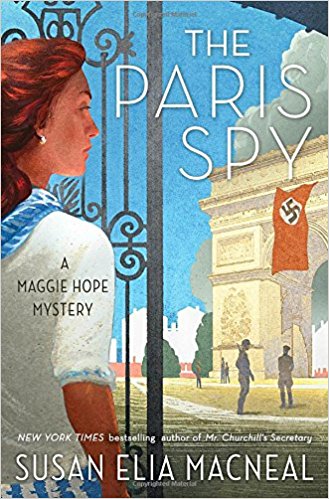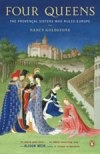 In July I joined the #Firemanalong, a group read hosted by Care’s Books and Pies and The Capricious Reader. The Fireman is the newest book from Joe Hill, son of Stephen King, about whom I’ve been most curious.
In July I joined the #Firemanalong, a group read hosted by Care’s Books and Pies and The Capricious Reader. The Fireman is the newest book from Joe Hill, son of Stephen King, about whom I’ve been most curious.
I was all set for this to be a new favorite, especially after reading the opening page, in which Hill cites as “inspiration”: J.K. Rowling, P.L. Travers, Julie Andrews … and Ray Bradbury. Excellent!
Hill has fun with his allusions, one moment citing Samuel Beckett and then MTV VJ Martha Quinn. There are also nods to Dumbledore, The Lion, The Witch, and the Wardrobe, Graham Greene, Mary Poppins, and, of course, zombies.
The Fireman starts out much like one of King’s novels in that it grabs you straightaway. It was an exciting and addictive page-turner … right until about page one hundred and forty-something, when it really slowed down. Considering the book was 747 pages, I wish Hill had kept up the thrill ride a bit longer.
The first part deals with an outbreak of a mysterious epidemic of “Dragonscale,” which causes its victims to self-combust. Hill offered a plausible and scientific explanation for the disease and that kept me invested.
Our heroine is a plucky nurse named Harper (after another of Hill’s favorite authors) who volunteers as a nurse and ultimately gets infected.
The scenes of mass hysteria and of the unraveling of society were believable and suspenseful. There’s a compelling, vivid urgency that makes you think, wow, this could happen. There are also several buzzy cameos: George Clooney, President Obama, and Glenn Beck.
 It wasn’t until Harper joined a sort of commune for the infected, Camp Wyndham, that the book stepped into the slow lane and became more of a morality tale. I felt Hill had pulled a bait-and-switch—I wanted more of the excitement that he had teased me with for over 100 pages.
It wasn’t until Harper joined a sort of commune for the infected, Camp Wyndham, that the book stepped into the slow lane and became more of a morality tale. I felt Hill had pulled a bait-and-switch—I wanted more of the excitement that he had teased me with for over 100 pages.
Instead, I got lots and lots (and lots) of backstory! I don’t know why Hill decided to go the route of having all the subplots and complications relayed second-hand. Hill is a master of twists and turns, but this genius was somewhat diluted because instead of experiencing it … we had it retold by other characters. I like my suspense real-time.
In particular, the Harold Cross subplot and the prison story would have been so gripping to read as they occurred. I cannot think why we had to hear about them postmortem? I wanted to be in there with the prisoners, looking around and fearful of what might happen next. What did happen would have been much more chilling to me if I didn’t already know who would survive. Also, the Mazz and Father Story question would have been spookier and more complicated if I had first known and identified with Mazz.
The Harold Cross thread reminded me of something from 24—the stray character who makes a series of judgment errors that escalate. I just wish I had gotten to experience that paranoia and tension. Likewise, I would have cared more about Cross’s fate.
Even if Hill were not King’s son I would be contrasting this to Under the Dome, in which King had several subplots spinning out at once via many lead characters. Michael Crichton also did this very well.
Since the action was elsewhere, the whole camp kibbutz storyline got stale for me. I wanted to know more about what was going on beyond their hideaway. The state of Maine had burned to a crisp, but what about the rest of the country? The rest of the world?
The camp dynamics of, say, who got soggy oatmeal versus who got fancy coffeecake seemed a bit trifling when there was a worldwide catastrophe going on.
Also, I felt a bit let down by the ending. I’m not asking for things to be tidied up and happy. I loved how Christopher Nolan tantalized us with the conclusions of Inception and The Dark Knight Rises. (I even loved the LOST finale!)
But, after 747 pages, I do expect some sort of pay off. This felt like it ended midstream with little resolution and almost no reveals as to what was next for Harper—or for the world. It was like ending halfway through Homer’s Odyssey and just as frustrating as the fuzzy, fade-to-black of The Sopranos.
Having said all this, I must add that Hill is a very good writer and (when he wants) can make for some addictive reading. If he had presented his subplots (with their creepy twists) firsthand and given them the same sense of urgency as the first one hundred pages, then The Fireman would likely have been *the* blockbuster, can’t-put-down book of the summer. Hill definitely has that potential.
Lots of the #Firemanalong readers loved the book! They posted all sorts of shrewd observations and fun reactions on twitter. Indeed, for me, the #Firemanalong was the best part of this read.
#Firemanalong at Care’s Books and Pies
#Firemanalong at The Capricious Reader
#Firemanalong on twitter
Like Word Hits On Facebook
Follow @WordHits on Twitter
 I’m so excited to be partaking in the 5th Annual Austen in August extravaganza of all things Jane Austen! This summer marked the 200th anniversary of her too early death on July 18, 1817, and this is a wonderful way to honor and celebrate our beloved Jane.
I’m so excited to be partaking in the 5th Annual Austen in August extravaganza of all things Jane Austen! This summer marked the 200th anniversary of her too early death on July 18, 1817, and this is a wonderful way to honor and celebrate our beloved Jane.
 In July I joined the
In July I joined the  It wasn’t until Harper joined a sort of commune for the infected, Camp Wyndham, that the book stepped into the slow lane and became more of a morality tale. I felt Hill had pulled a bait-and-switch—I wanted more of the excitement that he had teased me with for over 100 pages.
It wasn’t until Harper joined a sort of commune for the infected, Camp Wyndham, that the book stepped into the slow lane and became more of a morality tale. I felt Hill had pulled a bait-and-switch—I wanted more of the excitement that he had teased me with for over 100 pages.
 Indeed, SPQR at times reads like a House of Cards take on Roman history, as Beard narrates with suspense the political wranglings, betrayals, and changing power players over the centuries. I found all of this particularly compelling—and relevant—in light of the recent political upheaval and shifting alliances in the United Kingdom following the Brexit vote.
Indeed, SPQR at times reads like a House of Cards take on Roman history, as Beard narrates with suspense the political wranglings, betrayals, and changing power players over the centuries. I found all of this particularly compelling—and relevant—in light of the recent political upheaval and shifting alliances in the United Kingdom following the Brexit vote.
 Huffington contends that getting the full forty winks is crucial to success. “Sleep is my weapon,” she quotes Jennifer Lopez. Other prominent sleep proponents include supermodel Karlie Kloss, tennis god Roger Federer, and investment mogul Warren Buffet. Speaking of business, there’s a whole chapter on successful men and women who pointedly get eight hours each night. Oh, and the legendary Tom Brady? He goes to bed at 8:30 pm.
Huffington contends that getting the full forty winks is crucial to success. “Sleep is my weapon,” she quotes Jennifer Lopez. Other prominent sleep proponents include supermodel Karlie Kloss, tennis god Roger Federer, and investment mogul Warren Buffet. Speaking of business, there’s a whole chapter on successful men and women who pointedly get eight hours each night. Oh, and the legendary Tom Brady? He goes to bed at 8:30 pm.
 After three murderous mysteries, it was delightful to discover this festive and Christmassy caper.
After three murderous mysteries, it was delightful to discover this festive and Christmassy caper. “The Adventure of the Christmas Pudding” is an extended version of a story called “Christmas Adventure” which first appeared in the Sunday Dispatch in 1928. This longer version debuted in a collection of short stories also called The Adventure of the Christmas Pudding that was released only in the U.K. in 1960. This story was also published in several other collections as “The Theft of the Royal Ruby,” which is the title of the story I read in Double Sin and Other Stories.
“The Adventure of the Christmas Pudding” is an extended version of a story called “Christmas Adventure” which first appeared in the Sunday Dispatch in 1928. This longer version debuted in a collection of short stories also called The Adventure of the Christmas Pudding that was released only in the U.K. in 1960. This story was also published in several other collections as “The Theft of the Royal Ruby,” which is the title of the story I read in Double Sin and Other Stories.
 “It is, then, your opinion that Christmastime is an unlikely season for crime?” asks Hercule Poirot of Colonel Johnson, in Hercule Poirot’s Christmas (also published as Murder for Christmas and A Holiday for Murder).
“It is, then, your opinion that Christmastime is an unlikely season for crime?” asks Hercule Poirot of Colonel Johnson, in Hercule Poirot’s Christmas (also published as Murder for Christmas and A Holiday for Murder). “A Christmas Tragedy” is a short story in The Thirteen Problems collection, which was also published under the title The Tuesday Club Murders. I particularly like the setup, in which the different stories are told by a group of friends gathered together to discuss mysteries.
“A Christmas Tragedy” is a short story in The Thirteen Problems collection, which was also published under the title The Tuesday Club Murders. I particularly like the setup, in which the different stories are told by a group of friends gathered together to discuss mysteries. The narrative progresses with tension and a sense of impending doom. Some of the characters are shocked by the happenings and some seem to take a “positively ghoulish” delight in it all.
The narrative progresses with tension and a sense of impending doom. Some of the characters are shocked by the happenings and some seem to take a “positively ghoulish” delight in it all.










